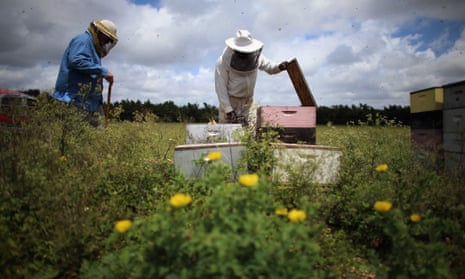Honeybees are dying off at too high a rate to guarantee their long-term survival, even though fewer were lost last winter, a US government report said on Thursday.
The total losses among hive honeybees across the country was 23.2% over the 2013-14 winter, the annual report from the US Department of Agriculture (USDA) found.
That is better than the 30.5% loss over the 2012-13 winter, but the report said the death rate among honeybees over the last eight years was still too high for the bees' long-term survival.
“While we are glad to see improvement this year, losses are still too high, and there is still much more work to be done to stabilise bee populations,” the agriculture secretary, Tom Vilsack, said in a statement.
About a quarter of America's food crop depends on pollination from honeybees – including almonds, apples and beans.
A number of studies – including one from Harvard researchers last week – have linked the collapse of honeybee populations to a widely used class of insecticides, which either kill the bees outright or make them more susceptible to pests and disease.
The insecticides, known as neonicotinoids, are used to increase the yields of staple crops such as corn. The European Union banned the three most widely used neonicotinoids last year.
However, the chemicals are still in use in America.
Agrichemical companies such as Monsanto, Dupont, Syngenta and Bayer – which either make the pesticides or use them for their seed products – say the collapse of the honeybees is due to other factors, including mites.
The report – which was producted in partnership with a Monsanto-owned firm, BeeLogis, offered no explanation for the improvement in the bees' survival rate.
"Yearly fluctuations in the rate of losses like these only demonstrate how complicated the whole issue of honey bee heath has become, with factors such as viruses and other pathogens, parasites like varroa mites, problems of nutrition from lack of diversity in pollen sources, and even sublethal effects of pesticides combining to weaken and kill bee colonies," said Jeff Pettis, co-author of the survey and the USDA's chief bee researcher.
Friends of the Earth said the findings supported their call for a ban on neonicotinoids.
“These dire honey bee numbers add to a consistent pattern of unsustainable bee losses in recent years,” said Lisa Archer, who heads the group's food and technology programme. “While various factors are contributing to bee deaths, a strong and growing body of science tells us we must take action now to protect bees from neonicotinoid pesticides.”
The survey results were based on information provided by some 7,200 beekeepers who managed some 564,522 colonies. Together they represent 21.7% of honeybee hives.











Comments (…)
Sign in or create your Guardian account to join the discussion